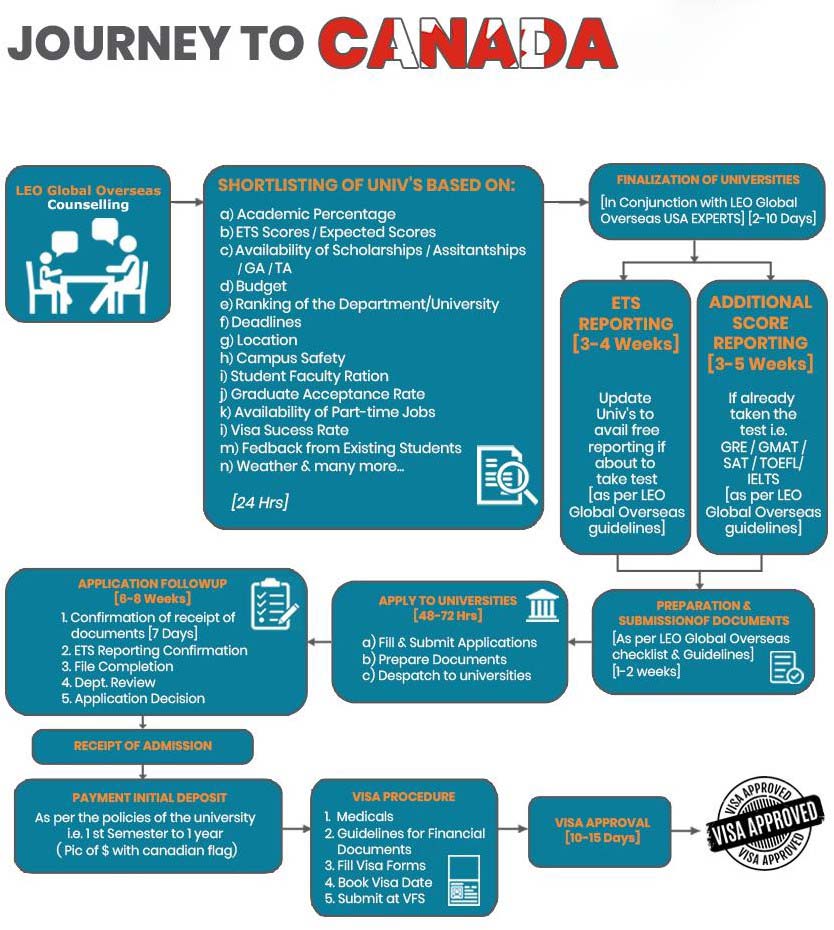
Canada is a developed country, with the ninth highest per capita income globally, and the 11th highest ranking in human development. Canada has one of the best evolved and advanced education systems in the world. The degree obtained from Canada is of high demand and value in other countries assuring that it will be a worthy career move. Canada’s advanced economy is one of the largest (eleventh) in the world, relying chiefly upon its abundant natural resources and well-developed trade networks, especially with the United States, with which it has had a long and complex relationship.
Reasons to Study in Canada
Thousands of International students select Canada for their further study each year. Students are attracted by the country's natural and man-made wonders, the peaceful environment, the cosmopolitan cities, multicultural communities, work and study structure, excellent training system and cost effective tuition and living expenses. The main reasons are explained below;
Safe, stable and friendly multicultural society with high standard of living
Canada is a very safe country. Political unrest is limited in Canada; crime rates are low and Canada is Secular. Your right to practice your faith without persecution or discrimination is protected by law. Canadians are open, friendly people and you will be received with a warm welcome and it has one of the highest standards of living in the world. It is home to people from over 190 countries and cultural diversity is part of its national identity. You can interact with students belonging to different cultural backgrounds and can develop contacts and friends from around the world.
Canadian qualifications are accepted globally and offer Internship Opportunities
Canadian skills training and qualifications are recognized around the world. Canadian education focuses on practical oriented training and most qualifications include paid or unpaid work terms. Hence when a student graduates, he/she will have
a good amount of practical exposure which gives them an easy gateway for job opportunities.
Education expenses are less when compared to the USA, the UK, and Australia
Canada offers significantly lower annual tuition fees for many popular courses in universities and colleges. Quality accommodation and good food are available at a reasonable rate. The living expenses declared for student visa application also is less when compared with the above countries.
You can improve your English proficiency
It is an English-speaking country, by living and studying in Canada you can improve your English proficiency.
Faster Admission Processing
If the application is correctly completed, then in most of the cases students will get an offer of admission in Canadian Colleges within 3-7 days and Universities within 7-15 days.
Fees can be paid in instalments
You only need to pay fees on a semester basis to your educational provider prior to each semester begins.
Credit Transfer from Diploma to Bachelor Degree
Students who intend to study University Bachelors programs initially can enrol in Canadian community colleges for diploma programs. By completing Canadian Diploma qualification your chances for admission in Canadian universities will improve. After the program you can apply for a post study work visa and can work full time. During your work you can pursue a bachelor degree and thereby can reduce your expenses. Since you have already completed diploma, you will get credit in bachelor degree and can complete degree in 2-3 years
You can work part-time while you study
In Canada you can work 20 hours weekly during your study and on vacation can work full time. This will give you an additional source to support your studies and obtain valuable work experience with a foreign employer.
Quick Visa Processing
Students can submit visa applications to Canadian High Commission up to 1 month prior to the course commencement. In most cases Canadian visa office finalizes the visa outcome within 10 days of your application.
Spouse work visa
If you study any full time program of minimum 1 year duration, your dependent can accompany you on Spouse Work Permit and can work full-time during your study and vacation. If you have a dependent child they can accompany on visitor visa.
Post study work visa
If you study 8 months to 2 years, you will get a post study work permit equivalent to the study and if you study 2 years or above, will get a post study work permit for up to 3 years. If the spouse has accompanied you, the spouse also will get a visa extension.
Job Opportunities in Canada
Compared to India Canada has a low population, but the country is more than double the size in structure. Canada has many growing industries and a number of multinational companies have set up branches in Canada. But the number of trained persons is insufficient so that many employers find it difficult to fill their vacancies. In this situation you have very good chances to get a job in Canada if you are well qualified and trained.
Opportunity for permanent residency in Canada
After two year study you will get a three year work permit in Canada. During this work permit you should obtain a minimum of one year work experience and after meeting points criteria you can apply for PR.
Added Benefits:
How much will it cost to study in Canada
A lot of people think that studying abroad will cost a fortune; however, studying in Canada is comparatively affordable. Even though Canadian international students have to pay higher tuition fees than domestic students, it's still cheaper than the educational cost of the U.S., the UK, and Australia. Below is a table of the average cost expectation you can have out of universities (However the following are just university averages and we recommend you should consult with a sumavarsha associate for more accurate figures):
|
Programs |
Yearly Fees |
|
Diplomas |
$14000 - $16000 |
|
Graduate Certificate & PG Diplomas |
$18,000 - $25,000 |
|
Masters |
$20000 - $26000 |
What Are The Student Visa Requirements For Canada?
To study in Canada, it is important to obtain a student study visa and if you are planning to get one, go through the points given below to know the requirements: Check eligibility criteria: Before applying for any Canadian institute, check the
eligibility criteria of the particular institute. Remember that you can only start the application process for the student visa only when you get the letter of acceptance from your university.
Submit the required documents for a Canada student visa such as identity proof, letter of acceptance, educational certificates, etc.
The processing time of your student visa application depends on the university. Scholarship To Study In Canada
A lot of Canadian universities offer a scholarship through various programs for both national and international students. The Canadian government offers international students the possibilities of attaining scholarship rewards, allowances, or backings to finance their education. The eligibility for scholarships is judged on the basis of outstanding academic grades and exceptional English Proficiency scores. Scholarships are mostly offered by the universities without any particular application based on the eligibility benchmarks but at some institutions the students need to apply for the same. Scholarships are majorly offered at the entrance level but for some scholarships the students are supposed to prove their excellence in academics in the subsequent years of education as well.
Canada is one of the pleasant places to live with abundant fresh water lakes and rivers, considerate population, lower incidence of violent crimes against international students and a good framework of health care system.
|
Location: Canada lies towards the Northern half of North America, bordering the North Atlantic Ocean on the east, North Pacific Ocean on the west, and the Arctic Ocean on the north. |
|
Geographic coordinates: 60° 00 N(42-83oN) and 95o 00W(53°W- 141°W) |
|
Map references: North America |
|
Area: Canada is the second largest country in the world and ranks fourth in terms of area. Total:9,984,670 km2 land:9,093,507 km2 water:891,163 km2 |
|
Area -comparative: Canada is slightly less than three-fifths as large as Russia and slightly larger than Europe. In total area, Canada is slightly larger than both the U.S. and China. |
|
Land boundaries: US to the south- 8,893 km (includes 2,477 km with Alaska) |
33,476,688 with81% urban population and 19% rural population. All the four provinces(Quebec, Ontario, British Columbia and Alberta) accounts majority of the population but, Ontario is the most populous province of the country with 38.4% of the population.
|
LARGEST STATE: |
Nunavut |
|
SMALLEST STATE: |
Prince Edward Island |
|
LARGEST CITIES: |
New York, Los Angeles, Chicago, Houston,Philadelphia, San Diego, Detroit, Dallas, Phoenix, San Antonio |
|
BORDER COUNTRIES AND OCEANS: |
Canada is bordered on the east coast, by the Atlantic Ocean, the west coast by the Pacific Ocean, and the north by the Arctic ocean and United States of America to the South. |
|
LANGUAGES: |
English 78.3% , French 21.7% , Non-official languages 2%(Punjabi, Chinese, Spanish, German, Cantonese, Italian) |
|
RELIGIONS: |
Canada has no official religion, and the government is officially committed to religious pluralism. Majority of Canadians are Christians, representing 67% of the population and Islam, second largest religion practiced by 3.2% of the population. |
FLOW CHART

 |
EDUCATION SYSTEM :
UNIVERSITIES LIST :
|
Vancouver |
|
Canada |
|
Montreal |
VISA :
What Are The Student Visa Requirements For Canada?
To study in Canada, it is important to obtain a student study visa and if you are planning to get one, go through the points given below to know the requirements:
On Campus
A homestay consists of a Canadian family hosting a student in their home while the student’s study course in Canada. Meals and a private, furnished room are provided,while amenities and location vary from home to home. Many schools can arrange for a school representative or homestay family to meet the student at the airport when he/she arrives. Average cost of homestay accommodation: $400 – $800 CDN per month.
Many schools provide accommodation comprising rooms in different sizes and quality and well furnished dormitories with shared kitchens, toilets, showers and laundry facilities including cafeteria and meals, located on or near their campus. Students can choose either of the options according to his/her convenience.
Average cost of residence/dormitory rooms: $3,000 – $7,500 CDN per school year.
Off Campus
Renting comes with varied availability and price,usually high in major cities.Students may share accommodation to reduce the cost or rent a suite which comes with a kitchen,toilet, bath and bedroom, within a large house which otherwise would cost too high for a single student to afford. Apartments are another option, where one has a kitchen, toilet, bath, and one or two bedrooms. Most of them do not include furniture or meals. Average cost of shared accommodations in Canada: $250 – $700 CDN per month.
Average cost of a suite or apartment: $400 – $1,500 CDN per month.